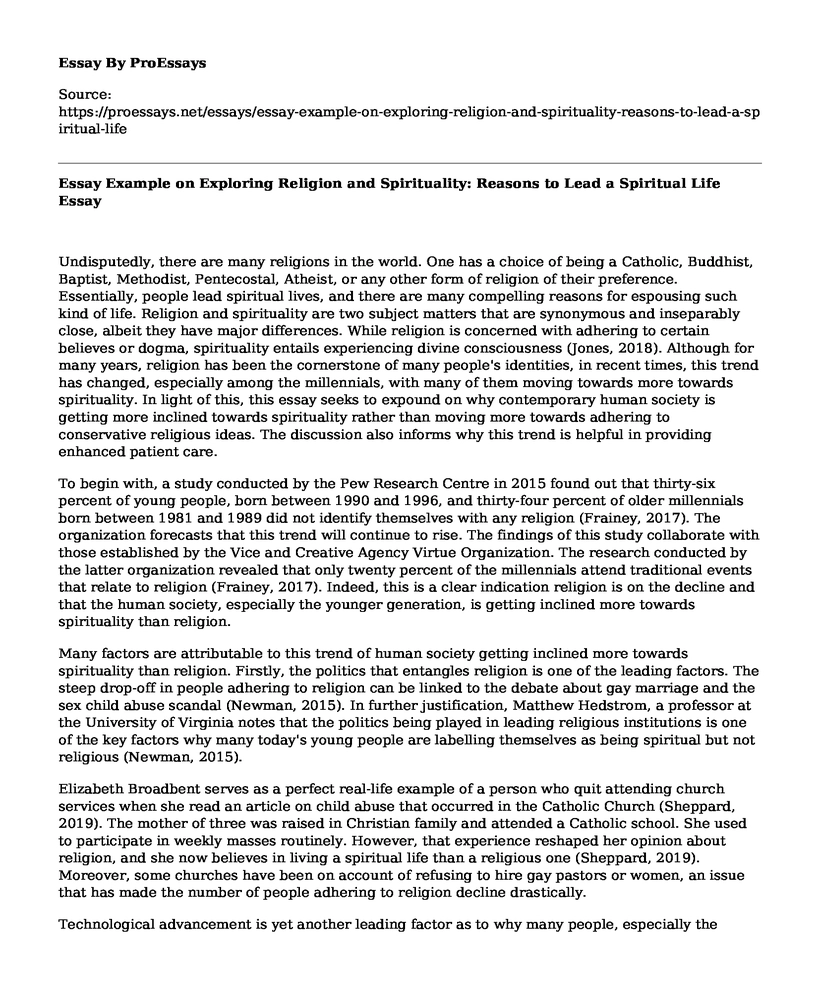Undisputedly, there are many religions in the world. One has a choice of being a Catholic, Buddhist, Baptist, Methodist, Pentecostal, Atheist, or any other form of religion of their preference. Essentially, people lead spiritual lives, and there are many compelling reasons for espousing such kind of life. Religion and spirituality are two subject matters that are synonymous and inseparably close, albeit they have major differences. While religion is concerned with adhering to certain believes or dogma, spirituality entails experiencing divine consciousness (Jones, 2018). Although for many years, religion has been the cornerstone of many people's identities, in recent times, this trend has changed, especially among the millennials, with many of them moving towards more towards spirituality. In light of this, this essay seeks to expound on why contemporary human society is getting more inclined towards spirituality rather than moving more towards adhering to conservative religious ideas. The discussion also informs why this trend is helpful in providing enhanced patient care.
To begin with, a study conducted by the Pew Research Centre in 2015 found out that thirty-six percent of young people, born between 1990 and 1996, and thirty-four percent of older millennials born between 1981 and 1989 did not identify themselves with any religion (Frainey, 2017). The organization forecasts that this trend will continue to rise. The findings of this study collaborate with those established by the Vice and Creative Agency Virtue Organization. The research conducted by the latter organization revealed that only twenty percent of the millennials attend traditional events that relate to religion (Frainey, 2017). Indeed, this is a clear indication religion is on the decline and that the human society, especially the younger generation, is getting inclined more towards spirituality than religion.
Many factors are attributable to this trend of human society getting inclined more towards spirituality than religion. Firstly, the politics that entangles religion is one of the leading factors. The steep drop-off in people adhering to religion can be linked to the debate about gay marriage and the sex child abuse scandal (Newman, 2015). In further justification, Matthew Hedstrom, a professor at the University of Virginia notes that the politics being played in leading religious institutions is one of the key factors why many today's young people are labelling themselves as being spiritual but not religious (Newman, 2015).
Elizabeth Broadbent serves as a perfect real-life example of a person who quit attending church services when she read an article on child abuse that occurred in the Catholic Church (Sheppard, 2019). The mother of three was raised in Christian family and attended a Catholic school. She used to participate in weekly masses routinely. However, that experience reshaped her opinion about religion, and she now believes in living a spiritual life than a religious one (Sheppard, 2019). Moreover, some churches have been on account of refusing to hire gay pastors or women, an issue that has made the number of people adhering to religion decline drastically.
Technological advancement is yet another leading factor as to why many people, especially the younger millennials, are not identifying themselves with any form of religion. Most of the people in today's human society have access to the internet that opens the door to information than ever before (Frainey, 2017). The internet helps them to dig deeper for answers to complex questions that relate to science yet the principles differ with those of religion. Reverend Phil Perez, a stout Christian and founder of the Association of Campus Religious Organizations obverses that older settings of churches are pushing younger people away (Frainey, 2017). This is why newer models, such as Osteen's Lakewood megachurch, are attracting more people- it offers powerful sermons, live bands, live broadcasting among many other elements that attract the today's digital generation. Thus, the recent advancements in technology have facilitated human society to be more inclined towards spirituality than religion.
Conclusion
Finally, it is notable that this trend has also played a central role providing enhanced patient care. This is because spirituality gives meaning and most important purposes to one's life. Indeed, believing in higher spirit helps in inspiring hope as well as seeking resolutions that transcend physical constraints. Thus, spirituality is related to better health outcomes and hence, it forms an indispensable facet of the patient-care.
References
Frainey, R. (2017). Millennials prefer spirituality. Retrieved from https://northernstar.info/opinion/millennials-prefer-spirituality/article_fad5537a-bd15-11e7-a934-bfc0fab1363d.html
Jones, K. F. (2018). Spirituality: More than just religion. Journal of the Australasian Rehabilitation Nurses Association, 21(2), 12.
Newman, C. (2015). Why millennials are leaving religion but embracing spirituality. Retrieved from https://phys.org/news/2015-12-millennials-religion-embracing-spirituality.html
Sheppard, S. (2019). How Millennials Are Making Sense of Religion. Retrieved from https://www.rewire.org/our-future/millennials-making-sense-religion/
Cite this page
Essay Example on Exploring Religion and Spirituality: Reasons to Lead a Spiritual Life. (2023, Feb 11). Retrieved from https://proessays.net/essays/essay-example-on-exploring-religion-and-spirituality-reasons-to-lead-a-spiritual-life
If you are the original author of this essay and no longer wish to have it published on the ProEssays website, please click below to request its removal:
- Giving Advice to Martin Luther. Paper Example on Religion Issue
- The Treatment of Women in Islam: Annotated Bibliography
- Essay Sample on Jesus and His Twelve Disciples
- Organization of Buddhism Structures and Sects Essay
- Discussion Paper Example on Christian Spiritual Vision
- Essay Example on Conflict Over Jerusalem as Israel's Capital City
- Islam Religion: Beliefs, History, & Impact on Christianity - Annotated Bibliography







